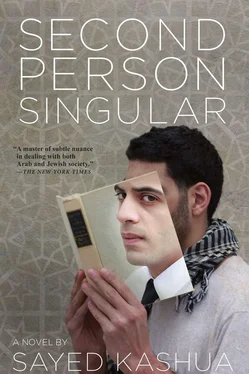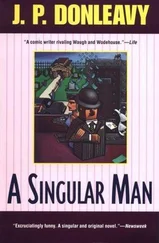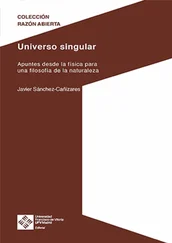“We get off at the next stop,” he said all of a sudden, still in Hebrew, as he pushed the bell. When we stepped off the bus, he switched back to Arabic. “Remember this stop,” he said. “Right next to the pizzeria on Herzl. One minute from here and you’re at work.”
I followed Ayub down a small side street in the Beit Hakerem neighborhood. This is Scout Street, he said, then filled me in on more details about the job. “The shift starts at seven in the evening and ends at seven in the morning. It’s okay to sleep while on duty — there’s even a couch there for that purpose — but don’t say anything about it in the interview. Say you don’t plan on sleeping. Even though Osnat knows you will. She does, too. It’s fine. All you have to do is set your alarm for every two hours. I don’t even really need to wake up to rotate him. I just do it and go straight back to sleep. In the morning I’m refreshed, I sleep better than at home,” he said, laughing. He stopped outside one of the houses and pushed open a small gate. I followed him through a modest little garden. It was a stand-alone house, two stories. “Remember,” he said before sliding the key into the lock, “Scout Street, number thirty-five.”
JELLY
A week later I made my way to Beit Hakerem for my first night shift with Yonatan.
“I hope you’re always this early,” Osnat said, opening the door for me. She was alone, which is to say just she and Yonatan were home. I followed her down the hall and flicked a glance to the right, toward the book-filled living room. She led me up the narrow wooden stairs to the attic, where Yonatan lay.
“Hi, Yonatan,” Osnat said as we walked into the room. A strong smell hit me, the smell of unventilated air, medicine, and hospital food. “Look who’s here,” she said in a loud voice, as though the increase in volume would heighten his perception. “He’s going to spend the night with you, okay, Yonatan?”
Yonatan lay on his back. I looked at him, nodded in his direction, and offered a mute hello. I had spent two or three hours a day with him the week before, learning how to do the job, and I wasn’t sure if he recognized me or not, if he was even capable of such a thing. His eyes were open, fixed on the ceiling. I steered my eyes away from him, so it wouldn’t look like I was staring.
Osnat shouldered her bag. “Oh, I nearly forgot,” she said, walking over to what she called the staff closet, “there are sheets and blankets here for you. Everything’s been washed, so make yourself at home. Ruchaleh will probably be back soon and she knows it’s your first night. If you need anything, I’ll be home in half an hour and my home number’s on the board. Feel free to call till around midnight, okay? See you tomorrow morning at seven. Good night. Have a good shift.” She wrapped herself in a heavy wool coat, walked toward the door, and said, “’Bye, Yonatan, good night.” Then she left.
I heard the door slam shut below and immediately threw open the attic window. Shoving my head out, I breathed in the crisp air. Then I slid the window back along its track till it was just barely open. The radiator was working full steam and Yonatan was tucked under a blanket that had been pulled up to his chin.
He was positioned in the middle of the room, on a large bed, on what Osnat called an electric egg-carton mattress. It was connected to a machine that sent waves through the mattress, preventing bedsores. Bedsores —that was the word I heard most from Osnat, so much so that it seemed to me that my main goal at work was to keep them at bay.
There was nothing for me to do with Yonatan until eight, when I would feed him his dinner. The food was in a jar in a small refrigerator in the corner of the attic and once he had eaten it I was supposed to give him a small container of jelly, instead of water, which he couldn’t swallow.
I sat down on the recliner and stole a few glances at Yonatan, just to make sure that the blanket was rising and falling with the rhythm of his breathing. His wide eyes were fixed on the ceiling, his face expressionless. Osnat had said that Yonatan’s condition was defined as vegetative and that the cause was an accident. Ayub said it was a car accident, but he wasn’t 100 percent sure. I got up and looked for figures in the lit windows of the high-rises on Herzl Boule-
vard, thinking of how jealous I had always been of people who live in big buildings looking over crowded streets. They would never be bored, they could always just look out the window and see people. They’d never feel like they were alone.
A substantial amount of space had been set aside for Yonatan. The attic was built like a studio, with a large bathroom and a grand desk. There was an old computer monitor on the desk and shelves full of books above it. There was also a sleek and powerful-looking stereo. The speakers, on either side of the desk, faced the bed and alongside one of them were two tall racks of CDs.
I ran my eyes down the long column of discs and found that I did not know a single one of them. I’d never had a CD player. At my mother’s house and in the apartment in Beit Hanina we only used a tape deck and cassettes. I looked over the books and some of the titles seemed familiar, even though I’d never read any of them. The truth is that back then the only books I’d ever read were the young adult books my mother used to bring back from the school where she taught in Jaljulia. She talked a lot about how important it was to read, even though she never did it herself, and there were few books at home. At one point she bought me a set of encyclopedias — the school principal was a salesman — and I read from them pretty often. They, for instance, taught me about the reproductive system. I spent many a long hour in front of the strange genitalia illustrations, especially the female ones. I had read the chapter called “The Human Body” close to a million times.
I was sure that prior to the accident Yonatan had been a musician. There was a hard black guitar case in the room and a black box that looked like an amp. There were posters of what must have been his favorite bands up on the walls. One stretch of wall was decorated with framed photos, but they weren’t family pictures or anything like that, they were just photos, not always clear, sometimes shadowy and blurry, all in black and white. I thought to myself that it would have been interesting to hear him play, this Yonatan.
I was jealous of people who could play music. When I was a kid I really wanted to learn how to play an instrument, and for a while my wish came true. An engineer who lived in the village had gone to study in Russia and had come home with a music teacher for a wife. The engineer had not found work and his Russian wife, who was known in the village as Sweeta, started offering piano lessons to the kids in the village. My mother sent me to her house every Wednesday and for six months I had a weekly one-hour lesson. Sweeta was happy with my progress and said that if I wanted to continue to develop I had to have a piano at home. It could be a used one, she said, or an organ would be okay, too, but I had to have something to practice on. Mom went to Petach Tikva especially and bought me a battery-operated keyboard. When I brought it over to Sweeta’s house, she said that it wasn’t an instrument at all, that it was a toy. She showed me how it played nursery rhymes. And it only had eight keys, which was useless, because I needed to practice playing with two hands. That was my last lesson. I told my mother, who didn’t understand why I had given up the piano, that the teacher had said I wasn’t good enough.
LIQUID FOOD
I took the jar of food out of the fridge and placed it on the bedside table. Pressing the button, I raised Yonatan’s bed to what I thought was a suitable angle. His expression never wavered, and his stare, which had been set on the ceiling, was now leveled at the desk opposite his bed. I brought a chair over to the side of the bed and looked at the clock. In a minute it would be eight p.m.
Читать дальше












